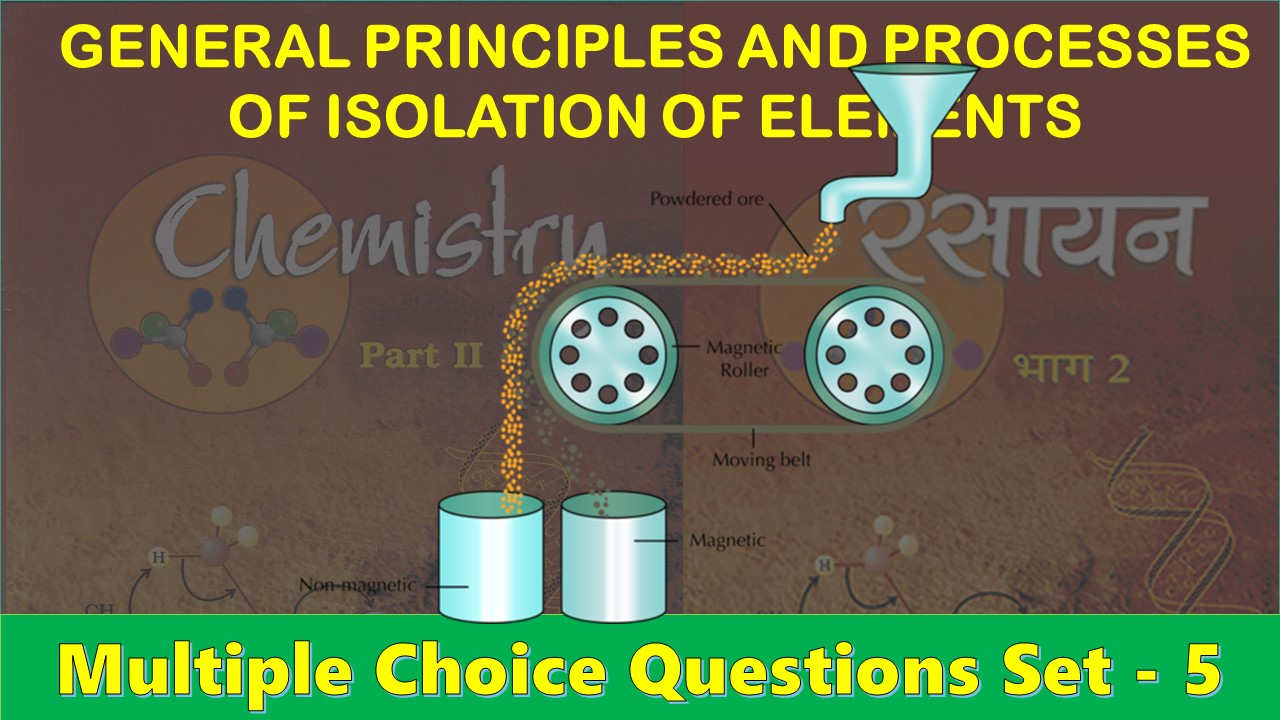CBSE Class 12 General Principles and Processes of Isolation of Elements Multiple Choice Questions with Answers. MCQ Questions Class 12 General Principles and Processes of Isolation of Elements with Answers Is Prepared Based on Latest Exam Pattern. Students can solve NCERT Class 12 General Principles and Processes of Isolation of Elements MCQs with Answers to know their preparation level.
Students who are searching for NCERT MCQ Questions for Class 12 General Principles and Processes of Isolation of Elements with Answers are compiled here to get good practice on all fundamentals. Know your preparation level on MCQ Questions for Class 12 General Principles and Processes of Isolation of Elements with Answers. You can also verify your answers from our provided MCQ Class 12 General Principles and Processes of Isolation of Elements with Answers. So, ace up your preparation with MCQ of Class 12 Chemistry Examinations.
MCQ Questions Class 12 General Principles and Processes of Isolation of Elements with Answers - Set - 5
Question 1:
Which of the following sulphides when heated strongly in air gives the corresponding metal without undergoing separate reduction of oxide?
(a) Cu2S
(b) FeS
(c) HgS
(d) ZnS
Correct Answer – (C)
Question 2 :
Which of the following ores cannot be concentrated by magnetic separation?
(a) Haematite
(b) Malachite
(c) Magnetite
(d) Siderite
Correct Answer – (B)
Question 3 :
Common impurities present in bauxite are
(a) CuO
(b) ZnO
(c) CaO
(d) SiO2
Correct Answer – (D)
Question 4 :
Which of the following ores is concentrated by chemical leaching method?
(a) Cinnabar
(b) Argentite
(c) Copper pyrites
(d) Galena
Correct Answer – (B)
Question 5 :
Which of the following metals is not extracted by leaching?
(a) Aluminium
(b) Mercury
(c) Silver
(d) Gold
Correct Answer – (B)
MCQ Questions Class 12 General Principles and Processes of Isolation of Elements with Answers
Question 6:
The significance of leaching in the extraction of aluminium is
(a) it helps removing the impurities like SiO2, Fe2O3 etc. from the bauxite ore
(b) it converts the ore into oxide
(c) it reduces melting point of the ore
(d) it eliminates water from bauxite
Correct Answer – (A)
Question 7:
An ore of tin containing FeCrO4 is concentrated by
(a) gravity separation
(b) magnetic separation
(c) froth floatation
(d) leaching
Correct Answer – (B)
Question 8:
How do we separate two sulphide ores by froth floatation method?
(a) By using excess of pine oil
(b) By adjusting proportion of oil to water or using depressant.
(c) By using some solvent in which one of the sulphides is soluble
(d) By using collectors and froth stabilisers like xanthates
Correct Answer – (B)
Question 9:
Sulphide ore of zinc/copper is concentrated by
(a) floatation process
(b) electromagnetic process
(c) gravity separation
(d) distillation
Correct Answer – (A)
Question 10:
The oil used as frothing agent in froth floatation process is
(a) coconut oil
(b) castor oil
(c) palmitic oil
(d) pine oil
Correct Answer – (D)
- NCERT Solutions Class 11 Chemistry Chapter 1 : Some Basic Concepts of Chemistry
- NCERT Solutions Class 11 Chemistry Chapter 2 : Structure Of The Atom
- NCERT Solutions Class 11 Chemistry Chapter 3 : Classification of Elements and Periodicity in Properties
- NCERT Solutions Class 11 Chemistry Chapter 4 : Chemical Bonding and Molecular Structure
- NCERT Solutions Class 11 Chemistry Chapter 5 : States of Matter
- NCERT Solutions Class 11 Chemistry Chapter 6 : Thermodynamics
- NCERT Solutions Class 11 Chemistry Chapter 7 : Equilibrium
- NCERT Solutions Class 11 Chemistry Chapter 8 : Redox Reactions
- NCERT Solutions Class 11 Chemistry Chapter 9 : Hydrogen
- NCERT Solutions Class 11 Chemistry Chapter 10 : The s-Block Elements
- NCERT Solutions Class 11 Chemistry Chapter 11 : The p-Block Elements
- NCERT Solutions Class 11 Chemistry Chapter 12 : Organic Chemistry: Some Basic Principles and Techniques
- NCERT Solutions Class 11 Chemistry Chapter 13 : Hydrocarbons
- NCERT Solutions Class 11 Chemistry Chapter 14 : Environmental Chemistry



